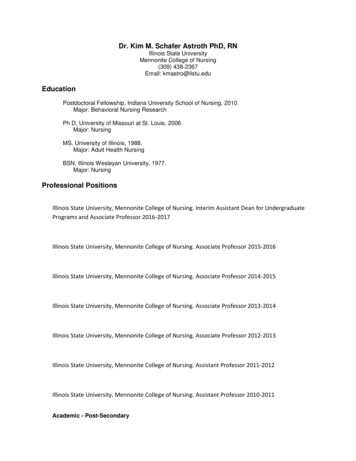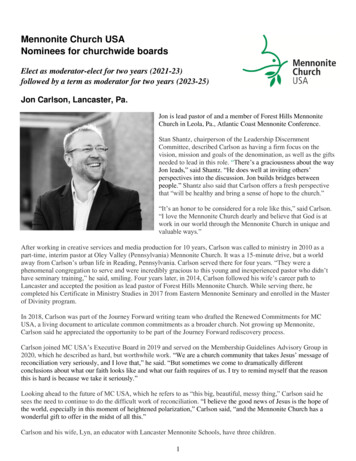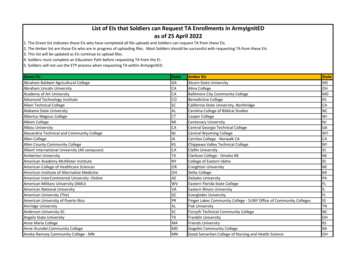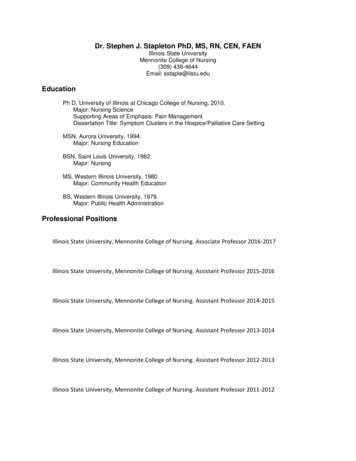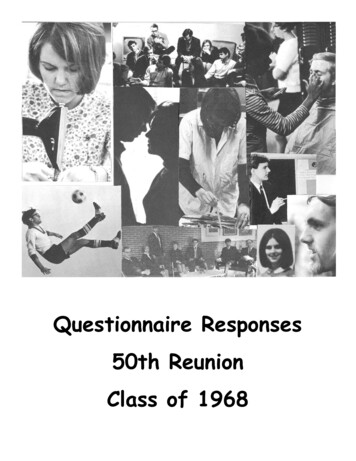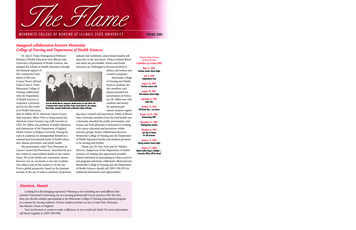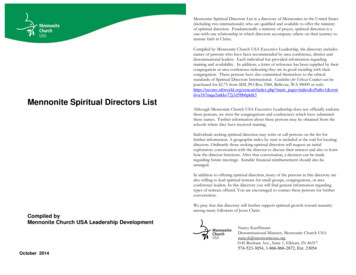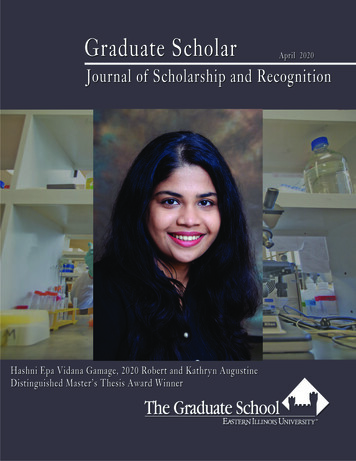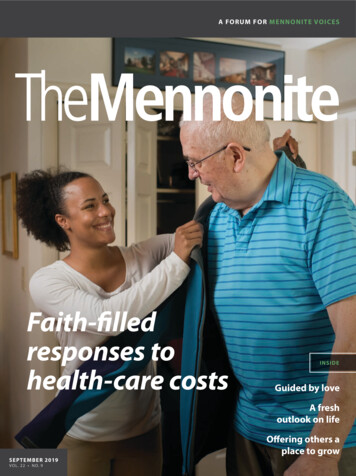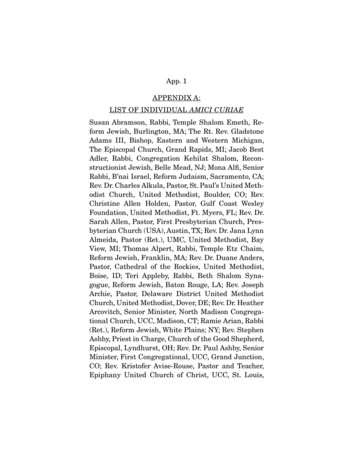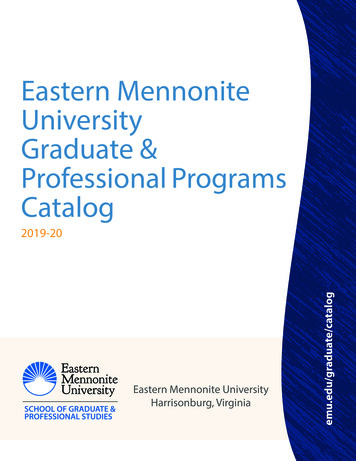
Transcription
Eastern MennoniteUniversityGraduate &Professional ProgramsCatalogEastern Mennonite UniversityHarrisonburg, Virginiaemu.edu/graduate/catalog2019-20
Graduate Catalog HomeEastern Mennonite University Graduate Catalog2019-20All Graduate Program InformationAccreditationsEMU Mission, Vision and ValuesGraduate Program Philosophy, Values and GoalsAcademic PoliciesFamily Education Rights and Privacy Act of 1974Nondiscrimination PolicyOffice of Academic AccessGraduate Writing StandardsFinancesGeneral Contact and Location InformationUniversity Administration and PersonnelEmergency ContactsBiomedicineAbout- BiomedicineAdmissions Requirements- Biomedicine programCertificate Requirements- BiomedicineDegree Requirements- BiomedicineCourse Descriptions- BiomedicineCenter for Justice and PeacebuildingAbout the Center for Justice and PeacebuildingAdmissions Requirements- Center for Justice and PeacebuildingAcademic Policies- Center for Justice and PeacebuildingDegree Requirements- Center for Justice and PeacebuildingGraduate Certificate Requirements - Center for Justice and PeacebuildingCourse Descriptions - Center for Justice and PeacebuildingCollaborative MBAAbout Collaborative MBAAdmissions Requirements- Collaborative MBAAcademic Policies- Collaborative MBADegree Requirements- Collaborative MBACourse Descriptions- Collaborative MBACounselingAbout MA in CounselingAdmission to MA in CounselingDegree Requirements- CounselingCourse Descriptions-CounselingDoctor of Nursing PracticeAbout Doctor of Nursing PracticeAdmissions Requirements- DNPDegree Requirements - DNPCourse Descriptions- DNPDual DegreesMaster of Divinity and Master of Arts in Conflict Transformation or Master of Arts in Restorative Justice Dual DegreeMaster of Divinity and Master of Arts in Counseling Dual DegreeMaster of Divinity and Master of Business Administration Dual DegreeMS in Nursing and MBA Dual DegreeMBA and Health Care Management Dual DegreeMS in Biomedicine and MA in Health Care Management (HCM) DegreeEastern Mennonite SeminaryEducationAbout EducationAdmissions Requirements- EducationCertificate Requirements- EducationDegree Requirements- EducationCourse Descriptions- Graduate Teacher EducationHealth Care ManagementAbout Health Care ManagementAdmissions Requirements- Health Care ManagmentDegree Requirements- Health Care ManagementCertificate Requirements- Health Care ManagementCourse Descriptions- Health Care ManagementInterdisciplinary StudiesAbout Interdisciplinary StudiesAdmissions - Interdisciplinary StudiesProgram Policies- MAISDegree Requirements- MAISMaster of Science in NursingAbout MSNAdmissions Requirements- MSNDegree Requirements- MSN1
Course Descriptions- MSNMasters in Business AdministrationAbout the MBAAdmissions Requirements- MBACertificate Requirements- BusinessDegree Requirements- MBACourse Descriptions- MBAOrganizational LeadershipAbout Organizational LeadershipAdmissions for Organizational LeadershipCertificate Requirements- Organizational LeadershipDegree Requirements- MA in Organizational LeadershipCourse Descriptions- Organizational Leadership2
All Graduate Program InformationAccreditationsEMU Mission, Vision and ValuesGraduate Program Philosophy, Values and GoalsAcademic PoliciesFamily Education Rights and Privacy Act of 1974Nondiscrimination PolicyOffice of Academic AccessGraduate Writing StandardsFinancesGeneral Contact and Location InformationUniversity Administration and PersonnelEmergency ContactsAccreditationsUniversity Accreditations and CertificationsSouthern Association of Colleges and Schools (SACS) Commission on CollegesState Council of Higher Education for Virginia (SCHEV)Council for Accreditation of Counseling and Related Educational Programs (CACREP)Commission on Collegiate Nursing Education (CCNE) Council on Social Work Education (CSWE)National Council for Accreditation of Teacher Education (NCATE through CAEP)Association of Clinical Pastoral Education (ACPE)Association of Theological Schools in the United States and Canada (ATS)Student achievement goals, measures and performance data is available on emu.edu. More information on the individual accreditations and certificationsis available below.Southern Association of Colleges and Schools (SACS) Commission on CollegesEastern Mennonite University is accredited by the Southern Association of Colleges and Schools Commission on Colleges to award associate,baccalaureate, master’s, and doctorate degrees. Contact the Southern Association of Colleges and Schools Commission on Colleges at 1866 SouthernLane, Decatur, Georgia 30033-4097 or call 404-679-4500 for questions about the accreditation of Eastern Mennonite University.State Council of Higher Education for Virginia (SCHEV)The university is certified by name to operate by the State Council of Higher Education for Virginia (SCHEV). Students and prospective studentsmay find the information resources of the SCHEV of use in planning for college and careers, including SCHEV’s institutional profile for each Virginia publiccollege and university, and for each independent college or university participating in the Virginia Tuition Assistance Grant Program. Here is EMU’s SCHEVprofile.NCATE Teacher Education AccreditationOur teacher education program has carried the highest national accreditation standards in the nation for more than 45 years. EMU is National Council forAccreditation of Teacher Education (NCATE) accredited through the Council for the Accreditation of Educator Preparation (CAEP).CACREP Counseling AccreditationEMU’s MA in counseling program is accredited in Community Mental Health Counseling by the Council for Accreditation of Counseling and RelatedEducational Programs (CACREP).CCNE Nursing AccreditationEMU’s undergraduate and masters programs in nursing are approved by the Virginia Board of Nursing and accredited by the Commission on CollegiateNursing Education. The school nurse certification program is approved by the Pennsylvania Department of Education.CSWE Social Work AccreditationEMU is accredited by the Council on Social Work Education (CSWE) which serves as the national accrediting and standard-setting agency for bothgraduate and undergraduate social work programs. The EMU social work program also draws on the National Association of Social Workers’ Code ofEthics to inform its goals, objectives, and ethical principles.Seminary Accreditations32019-20 Graduate Catalog, EMU
Association of Theological Schools (ATS)Eastern Mennonite Seminary is accredited by SACS as well as the Commission on Accrediting of the Association of Theological Schools in the UnitedStates and Canada.UMC Pastor OrdinationThe seminary is approved by The United Methodist Church for the training of candidates for ordination.Association for Clinical Pastoral Education (ACPE)The seminary’s clinical pastoral education program is accredited by the Association for Clinical Pastoral Education, Inc., an accrediting agency in the fieldof clinical pastoral education recognized nationally by the U.S. Secretary of Education through the U.S. Department of Education.Council of Mennonite SeminariesThe seminary is also a member of the Council of Mennonite Seminaries, which includes Anabaptist Mennonite Biblical Seminary, Elkhart, Indiana, andMennonite Brethren Biblical Seminary, Fresno, California.EMU Mission, Vision and ValuesWhat does the Lord require of you, but to do justice, love mercy, and to walk humbly with your God? —Micah 6:8MissionEMU prepares students to serve and lead in a global context.Our community of learning integrates Christian faith, academic rigor, artistic creation and reflective practice informed by the liberal arts, interdisciplinaryengagement, and cross-cultural encounter.VisionEMU will be renowned for academic excellence and faithful discipleship in addressing the most significant challenges in our complex world.We seek to be a leader among Christian universities, united by a hopeful and enquiring spirit, cultivating meaningful relationships locally and globally, andengaging the rich diversity of human identity, experience, and need.ValuesEMU’s mission and vision are grounded in the enduring biblical values of Christian discipleship, community, service, and peace.These values are embodied throughout the university in our distinctive commitment to peacebuilding, social justice, cross-cultural engagement, andsustainability. Rooted in the Anabaptist tradition, we follow Jesus’ call to bear witness to truth, serve with compassion, and walk boldly in the way ofnonviolence and peace.Approved by EMU Board of Trustees, June 23, 2017EMU’s mission, vision and values are the foundation of EMU’s strategic plan.Graduate Program Philosophy, Values and GoalsYour values. Your career goals. Combine them through graduate studies at Eastern Mennonite University and prepare to transform your world for thecommon good.What is ‘Leadership for the Common Good’?Leadership for the common good is a beliefthat developing authenticity in people is the way to help them transform their world. That the common good is established each time a person,organization, or community reaches beyond individual self-interest for the sake of the greater whole. To that end, our graduate programs are led by scholarpractitioners who are experts in their fields and who focus our curriculum on personal formation, competency, and relationships in developing leaders whowork to transform their world and enhance the common good in their workplaces and communities.Personal Formation42019-20 Graduate Catalog, EMU
Developing authentic leaders on a journey of integration, spiritual growth, and maturity. Our graduate students become leaders who understand thatpersonal, organizational, and community existence are tied to the sustainability of local and global systems.CompetencyDeveloping transformative leaders who design organizations and nurture communities to be resilient and sustainable with skills in entrepreneurship,shared vision development, mutual accountability, financial integrity, continuous innovation, empowerment of people and teams, and systems thinking.RelationshipsUnderstanding that in community we build and maintain trustworthy relationships with each other and the Sacred and that problem-solving must becontextual based on constituent and community life conditions. In this context, we transform personal, organizational and community conflicts into healthyoutcomes.Our ValuesValues that are part of the Anabaptist Mennonite tradition – on which EMU is built – are woven across the curriculum of all programs. People from manydenominations and faith traditions appreciate these values and are a part of the EMU community.Growing SpirituallyAs leaders we are on a journey of spiritual formation and growth, drawing on our spiritual resources to improve our communities and organizationsHonoring CommunityWe live, learn, grow, and thrive in relationship with others. We believe that learning occurs best in the context of diverse community.Leading as ServiceTransformative leadership starts with self-awareness and leads to empowering and serving others.Upholding Justice and Building PeaceWe recognize that all human beings needs acknowledgement of their dignity and a dignified way of earning their living; this implies a fair andcompassionate distribution of the fruits of economic growth, sensitivity to the impact of growth, and a commitment to living in right relationship with othersand with the planet. Peacebuilding requires upholding these values by applying one’s personal and professional skills and resources to the problems,reducing violence and promoting just relationships and structures.Planning for SustainabilityBusiness, organizational, community and global economic success are vital for healthy societies as is a recognition of our interdependence with theenvironment.Global CitizenshipWe are interdependent and mutually accountable to local, national, and global communities. As a result, we believe in interdisciplinary, cross-cultural, andinterfaith engagement around world problems.Health and HealingWe support practices that enhance personal health and wholeness. Resilience in the face of personal and collective trauma is critical to health, healing andreconciliationAcademic PoliciesThe information in this Graduate Catalog applies to the academic year 2019-20. The university reserves the right to change programs of study, academicrequirements, the announced university calendar and other matters described herein without prior notice, in accordance with established procedures. Eachgraduate student should understand that published descriptions of degree requirements establish only minimum requirements. It is the prerogative of thegraduate program to make changes in degree requirements at any time. The policies in the document are for all graduate programs. Please see individualprogram policies for additional information. In lieu of no specific EMU graduate program policy, the individual graduate department policies apply. Pleasereview individual program policies for additional information. This Graduate Catalog is descriptive and is not to be construed as a legal contract.Please see the Graduate Student Handbook for student life related policies.Academic Integrity PolicyEastern Mennonite University fosters a culture where faculty, staff, and students respect themselves and others. In this culture, faculty, staff, and studentsgain confidence in their desire and ability to discover their ideas, construct new knowledge, and think critically about their own ideas and the ideas ofothers. In doing so, EMU community members grow as competent thinkers and writers.EMU faculty and staff care about the integrity of their own work and the work of their students. They create assignments that promote interpretativethinking and work intentionally with students during the learning process. Honesty, trust, fairness, respect, and responsibility are characteristics of acommunity that is active in loving mercy, doing justice, and walking humbly before God.52019-20 Graduate Catalog, EMU
At EMU, academic integrity meanshonesty in producing one’s own work.use of documented course information and aids.submission of work that is one’s own.honesty in representation of research results, one’s credentials, and facts or opinions.honesty in use of technology, including cell phones and the Internet.honesty in acknowledging sources used in research and presented in papers and other assignments.honesty in establishing and maintaining the appropriate parameters of collaborative work.Academic integrity includesusing accurate quotations. When used, quotations are exact, word-for-word as they appear in the original document. Every quotation, including ashort phrase or a single word if it is unusual, includes the required citation and quotation marks.using appropriate paraphrasing with documentation. Paraphrasing is more than rewording the original material. It must be nearly entirely in thewriter’s own words, using new phrases and synonyms. The writer may repeat technical terms. Place quotation marks around any exact words thatare retained. The sentence structure should not be the same as in the source. In the paraphrase, do not add interpretations, ideas, andassessment that are not in the original source.documenting and citing work that was created for a previous assignment, whether for the current course or for another one.using appropriate documentation when using words from a class speaker, including the class instructor, in an assignment, i.e. cite professors’lectures.using common knowledge appropriately. Common knowledge is information that is easily observed, commonly reported facts (GeorgeWashington was the first president of the United States.), or proverbs. Common knowledge does not need to be cited, but be certain that thesewords are in the public domain. When in doubt, ask the professor.using a dictionary to produce original work in a second language. When using software like Google Translate, to translate words, sentences, orparagraphs from one’s native language to the second language, the student is copying and not learning the language or applying skills learned inthe classroom. Use a translation dictionary (i.e. English-Spanish, English-Bulgarian) to find the precise word or idiom needed to construct asentence. Entries in a dictionary are more accurate than software that translates phrases and paragraphs. Professors would like to see youroriginal work, not the work of a machine.EMU defines plagiarism as occurring when a person presents as one’s own someone else’s language, ideas, or other original (not common-knowledge)material without acknowledging its source (adapted from the Council of Writing Program Administrators, 2005, www.wpacouncil.org).Academic integrity violation for students may be evidenced as aMinimal ViolationA minimal violation of academic integrity codes includes doing the following without appropriate documentation:1.2.3.4.5.using a minimal number of distinguishing words from a source.rearranging the word order of a sentence.producing a similar sentence or style from a source.using an idea or argument from a source.reproducing one’s own work from a previous work.(These items are adapted from “Westmont College Plagiarism Policy” (2002), www.westmont.edu.)Substantial ViolationA substantial violation of academic integrity codes includes (but is not limited to):1. cheating on a quiz, test, or exam.2. copying or attempting to copy someone else’s work, including paraphrasing or quoting a professor’s classroom lectures, handouts, andpresentations without appropriate documentation.3. falsifying results and credentials, withholding data, misrepresenting facts.4. using someone else’s work as one’s own work.5. using quotations with no documentation.6. using an online source by copying and pasting with no documentation. Online sources may appear free. In this case, free means economicallyfree. While a source may not be paid for, it is to be used only for its specified use. A citation must be given if words, graphics, or ideas are used.7. presenting material as one’s own from a site that sells essays. Some of the papers-for-sale sites do have disclaimers that state the work must becited. Remember, if a source can be found, the professor can also find it.8. frequently committing minimal violations within a single document or repeatedly over time.9. Assisting another student to cheat or to copy one’s own or someone else’s work without appropriate documentation.10. Using Google Translator or other software to translate work from one’s native language to the language of instruction and submitting the work asone’s own work.Undergraduate academic departments and graduate units are responsible for establishing right-of-use parameters for non-print materials (e.g.presentations).Procedures (Graduate, Seminary, and Undergraduate)When a student violates academic integrity values, the student and professor/advisor will work together to restore the student to community.Procedures for Minimal Violations62019-20 Graduate Catalog, EMU
When a first-time minimal violation is noted, the professor will use this as an opportunity to teach the student/s explicitly about academic integrity. Aminimal violation should be reported to the respective dean’s office using the Academic Integrity Violation form. When a second minimal violation occurs,either within the same class or in multiple classes with the same instructor, faculty will document this as a substantial offense using the Academic IntegrityViolation form.Procedures for Substantial Violations¹At EMU, when academic integrity codes are violated to this level, the following procedure will be followed.The professor will:notify the student of the violation.determine whether the student is guilty of the violation.contact the respective chair or program director’s office to check on previous student violations in order to determine first, second or third offense.document the finding and the action either taken (First-time offense) or repeated (Second and Third-time offenses) on the Violation of AcademicIntegrity Record.meet with the student to obtain the student’s signature, either acknowledging her/his violation or acknowledging discussion in which the professorexplained the charges to the student. In the event that a student refuses to sign, the professor will document that the violation was discussed withthe student and the student refused to sign. (Under some circumstances, the professor may want to request another professor present aswitness. Students have the option to include a faculty or staff member, e.g. academic advisor, student life personnel, coach.)submit the Violation of Academic Integrity Record to the respective chair or program director. Copies are forwarded to the dean.The dean will:for undergraduate students, inform the Vice President for Student Life of violations and actions taken.for all students, follow steps described below for Second and Third-time offenses.The student will either:1.2.accept the decision orsubmit an appeal to the respective dean in writing within five (5) working days following notification of the Academic Integrity Violation report.Reasons for the appeal must be clearly stated and based on one of the following:a. Significant and relevant new evidence,b. Alleged procedural error that may have affected the decision, orc. Unduly harsh and arbitrary consequences of the academic integrity violation.On the basis of these factors, the dean will review the appeal and, in consultation with the course professor, make a decision to uphold or modify theacademic integrity violation record. This decision will be communicated to the student in writing within five (5) days after the receipt of the appeal. Thedecision is final.Each dean will maintain a database recording all violation of academic integrity reports. Reports of substantial violations will be kept as part of the student’s permanent record, unless a report is withdrawn following appeal.Consequences for Undergraduate StudentsFirst-time substantial violation: If a student cheats on a quiz, test, blog, forum, other online assignments, or exam or plagiarizes material in anassignment, assignment receives an F or 0 grade at faculty discretion. For an extreme first time offense, a professor may give the student an F forthe course (e.g. essay taken from Internet, test answers from another source). At the discretion of the professor, educational and restorativeoutcomes could include enrolling in an Academic Integrity workshop, provided by EMU’s Writing Program Director, revising and re-submitting theassignment.Second-time substantial violation: If the student repeats the above violation in the same or another course or commits another violation in thesame or another course, a professor may give the student an F for the course, and the student may receive a Letter of Probation.Third-time substantial violation: If the student commits the violation for the third time, the professor may give the student an F for the course,and the student may receive a Letter of Indefinite Suspension/Disciplinary Withdrawal.Upon re-enrollment and a subsequent violation, the professor may give the student an F for the course, and the student may be subject to aLetter of Dismissal at the discretion of the university.When a professor gives a student an F for the course, the student will not be allowed to withdraw from the course. The student is prohibited fromattending class after the professor assigns the F grade. The course continues to apply towards the number of credits the student is pursuing thatsemester.Consequences for Graduate StudentsEducative violation: At the faculty member’s discretion, this first-time violation may be used for the purpose of instruction when a studentplagiarizes any type of assignment (quiz, test, blog, forum, other online assignments, or exam or plagiarizes material in an assignment). At thediscretion of the professor, grade consequences may occur and educational and restorative outcomes could include enrolling in an AcademicIntegrity workshop, provided by EMU’s Writing Program Director, revising and re-submitting the assignment.First-time substantial violation: If a student cheats on a quiz, test, blog, forum, other online assignments, or exam or plagiarizes material in anassignment, a professor may give the student an F for the course (e.g. essay taken from Internet, test answers from another source) and thestudent may receive a Letter of Probation. When a professor gives a student an F for the course, the student will not be allowed to withdraw fromthe course. The student is prohibited from attending class after the professor assigns the F grade. The course continues to apply towards thenumber of credits the student is pursuing that semester.72019-20 Graduate Catalog, EMU
Second-time substantial violation: If the student commits the violation for the second time, the student may receive a Letter of IndefiniteSuspension/Disciplinary Withdrawal. (See Student Handbook, University Policies.)Faculty and staff who violate academic integrity codes are subject to review by the Provost’s office.The graduate, seminary, and undergraduate units use this policy for processing academic integrity violations with the exception of student appeal. (Seeabove.) This policy appears in yearly course catalogs; the Student Handbook; on graduate, seminary, and undergraduate websites. The AcademicIntegrity Policy flow chart is also available at rity.pdf.Reviewed by Undergraduate Council, Graduate Council, and Faculty SenateApproved by Academic Cabinet, March 25, 2009 and revised October 6, 2010Revised by Academic Cabinet, February 26, 2013Revised by Academic Cabinet, November 19, 2014Revised by Provost’s Council, December 16, 2015Revised by Graduate Council, April 1, 2019 and Approved by Provost’s Council, April 10, 2019Responsible partyThe provost is responsible for this policy.Policy ReviewThis policy is to be reviewed annually.¹ Adapted from American Association of Collegiate Registrars and Admissions Officers (2007) Academic Dishonesty: Developing and ImplementingInstitutional PolicyAdmission to CandidacyWhen students have been admitted to graduate study and enter into their graduate work, they are not yet candidates for a degree. Admission to candidacy(MA in Counseling calls this Admission to Internship) is contingent upon successful completion of such program specific requirements as a comprehensiveexam, supervised practicum, successful completion of coursework, etc.The student will normally meet all requirements for admission to candidacy upon completion of half of the credit hours required. The specific number ofhours or required courses is defined within each degree program. Admission to candidacy is required for work in the program beyond this point.To be admitted to candidacy the student must have completed the requisite number of semester hours, including any courses prerequisite to admission tocandidacy, with a 3.00 minimum GPA; met any program specific competency assessment criteria; actively participated in the advising process and met alladvising objectives; and obtained the formal approval of the faculty in the degree program.Students are reviewed for admission to candidacy during the semester in which they are expected to meet the requirements. Specific procedures foradmission to candidacy are established within each degree program.Admission: Decisions and AppealsEach graduate program establishes and maintains its admission requirements. Admission committees composed of faculty and staff members makeadmission decisions in each graduate program. A student denied admission may address a written appeal to the admission committee, providing additionalinformation pertinent to an admission decision. Prospective students may appeal a second denial of admission to the appropriate academic dean, whosedetermination for admission is final.Admission: Matriculation DeferralStudents who apply and are admitted to the graduate program but are unable to enroll in the term specified may request to have their admission deferredfor one academic year. If after one year the student is still unable to enroll, the student must re-apply for admission.Individual graduate programs will work with applicants on documentation needed for re-applying.AdvisingEach graduate student is appointed a faculty member to serve as an advisor. Until the faculty advisor’s appointment, the program director/coordinatorserves as the advisor. The faculty advisor helps the graduate student with career planning and course selection. The advisor also functions as a mentor,monitoring the student’s academic progress and working as an informal advocate for the student to the program faculty. Requests to change academicadvisors should be made to the program director/coordinator.Auditing82019-20 Graduate Catalog, EMU
Students may enroll to audit classes when there is room in a class and with permission of the instructor or program director/coordinator. Individualprograms may offer one or two options for auditing: 1) the standard audit or 2) the participation audit. Some courses may not be open to either type ofaudit. Please contact the teaching program for more information about participation expectations. No academic credit is granted for either type of audit.Students who enroll as auditors (standard or participation) will register and pay the designated audit fee. (See Financial section for audit fees). At the endof the class an audit designation will appear on the student’s transcript.Class AttendanceStudents are expected to be prepared, attend and participate in all class meetings. If unusual or emergency circumstances prevent class attendance, thestudent should notify the professor in advance if possible. Multiple absences from class will result in lower gr
Eastern Mennonite University Graduate Catalog 2019-20 All Graduate Program Information Accreditations EMU Mission, Vision and Values . The policies in the document are for all graduate programs. Please see individual program policies for additional information. In lieu of no specific EMU graduate program policy, the individual graduate .
